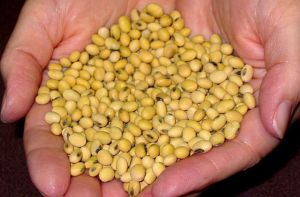 Monsanto has a reputation for tying farmers who use their genetically modified seeds to strict agreements to purportedly to protect the company’s patents, forbidding farmers to use seeds for more than one crop, or to sell or exchange them with other famers.
Monsanto has a reputation for tying farmers who use their genetically modified seeds to strict agreements to purportedly to protect the company’s patents, forbidding farmers to use seeds for more than one crop, or to sell or exchange them with other famers.
Vernon Hugh Bowman, a 75 year-old soybean farmer from Indiana, USA, and has been a loyal customer of Monsanto for many years. He thinks that Monsanto products are great, and the genetic modifications let the soybeans survive the country’s most popular weed killer, Roundup. He can get rid of the weeds without affecting his crop.
Bowman’s main crop uses Monsanto’s “Roundup Ready” soybeans which he plants in the spring. As part of Monsanto supplying the seeds, Bowman signs Monsanto’s standard exclusive agreement not to save any of the crop for replanting the following year.
As well as his main crop, Bowman likes to plant anther crop later in the season, which has a much smaller crop and is a riskier prospect for farmers.
Bowman didn’t want to buy expensive seeds for his second crop because of the risks, and from 1999 he started to buy ordinary soybeans – which were not being sold as seeds, and were sold as “Outbound Grain” – from a local grain elevator where farmers drop off their harvest each year.
Although Bowman bought the cheaper ‘ordinary’ grain for his riskier second harvest, he suspected that the soybeans may contain some grain with the Monsanto Roundup Ready gene in them, because that is what famers mainly plant in the region. The soybeans were made up of different varieties, and Bowman thought that Monsanto wouldn’t no longer have control these soybeans.
Monsanto heard what Bowman was doing and immediately launched a lawsuit against him for using their technology without paying for it. The ruling of the court ended with Bowman being ordered to pay $84,000 to Monsanto for patent infringement.
In response to the court’s ruling, Bowman immediately started an appeal to the Supreme Court.
Bowman has a team of lawyers who are representing him for free, and their case is cantered on an old principle in patient law.
Mark Walters of Frommer Lawrence and Haug, Bowman’s lawyers, says “If you buy something that’s covered by a patent — let’s say it’s a cell phone — you own it, outright. You’re allowed to put it on Craigslist and sell it, you’re allowed to use it for your ‘ordinary pursuits of life’ is the quote from some of the old cases that we’re relying on.”
Walters continued “Imagine how commerce would work if patents owners could come out of nowhere and surprise purchasers and tell them, ‘Oh, you need to pay me a royalty, because I own a patent on this thing that you just bought.'”
Monsanto’s counter-argument is that by purchasing Monsanto seeds, Bowman would be duplicating the patented gene, thereby infringing the patent.
The company controls a large share of the world’s seed market, and is eager to maintain that position and maximise their profits. In the past 20 years since Monsanto started to introduce GM crops, the price of soybeans has tripled.
The cross-pollination of crops is also an issue. If one farmer uses Monsanto seeds and a neighbouring one does not, there will be cross-pollination, which means that the non-Monsanto crops will contain the patented gene. Monsanto have prosecuted farmers who have crops which have been cross-pollinated, which is outside of the control of the farmers.
There is no doubt that Monsanto is an aggressive and unyielding company who will exploit every opportunity to try and gain total control over crops.
Farmers and consumers pay the price, both through the unknown effects of genetically modified crops, and through higher production costs artificially raised because of Monsanto.


